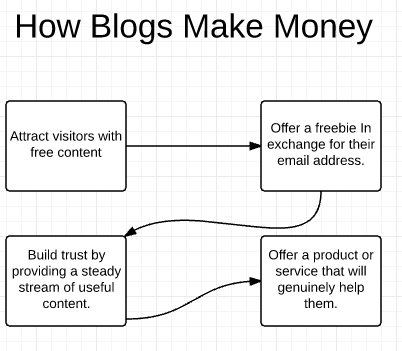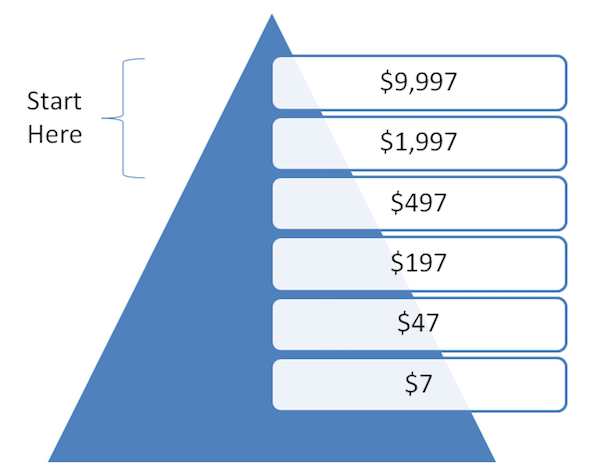The moment you decide to use your blog to make money, you’re no longer just a blogger. At that moment, you also become an entrepreneur, and your blog becomes a small business.
You’ve probably heard of financial planners giving free seminars to attract clients, right?
Well, blogging is a lot like those free seminars. You’re giving away your expertise and knowledge in the hopes of attracting customers and then gaining their trust.

In other words, if your goal is to make money with your blog, use it as a lead generation mechanism. Nurture those leads until they are ready to purchase, and the profit can quickly snowball.
Here’s How to Make Money Blogging
- Set up your blog
- Write content that gets lots of traffic
- Convert visitors into email subscribers
- Send those subscribers content that builds trust
- Sell products or services your audience wants
Start with Affiliate Marketing (or Services)
As I write this, it just so happens that I’m in the initial stages of starting a new blog (more details to be announced soon). It’s in a completely different space where I have no products, so I’ve been pondering the best way to monetize it, and here’s what I think…
Affiliate marketing is the smartest strategy.
If you’re not familiar with the term, it’s a business model where you endorse other people’s products or services in exchange for a commission. On software and information products, affiliates typically earn a 50% commission or sometimes even more, so it can be quite lucrative.
Granted, you won’t make that kind of money when your blog is small, but when you’re just starting to learn how to make money blogging, affiliate marketing is still a good way to start for several reasons:
- It’s faster. Instead of investing months or even years creating a product, all you have to do is publish a link on your site. Assuming your audience is engaged, you could be earning commissions within hours or even minutes.
- The income from affiliate marketing is almost entirely passive. You don’t have to worry about creating products, supporting customers, or any of the technical complexity of selling your own products or services. You can also invest the time you save into growing your traffic, leading to more revenue later.
- It can guide future product creation. If one affiliate product sells 10X better than all the others you promote, you might want to think about developing your own version of the product, because you have proof your audience wants it.
Build the Funnel in Reverse
Even if you’re making fantastic money from affiliate marketing or selling services, chances are you’ll want to try your hand at developing your own product at some point. So, where should you start?
My answer: with blogs, the most profitable price is usually the end of the funnel. Here’s what I mean…

You’ve seen a sales funnel, right? A company entices you with a freebie, then they offer you something cheap but irresistible, and then they gradually sweet talk you into buying more and more expensive stuff. It’s a tried and true marketing tactic, and you should absolutely build a sales funnel for your blog.
What you might not know is you should build it in reverse.
Offer services
While selling your services may not make you rich (look to passive income to do that!), it’s a great way to make some extra cash and to build up your reputation. Sell services directly related to the topic of your blog (e.g., catering for a food blog), or freelance blogging services like writing or graphic design.
Sell ad space
This is the strategy that most bloggers start with when looking to monetize their blog. However, keep in mind you’re not limited to selling banner ad spots (which is generally an ineffective strategy these days). Consider other areas you could rent out: space on your pop-up box, social media headers, the “P.S.” on your email newsletters…think outside the box (quite literally).
Offer consulting services
There’s a need for consultants in nearly every niche. Charge by the hour for the phone, email or Skype advice you’re probably already giving away for free.
Offer coaching services
Similar to consulting, coaching is usually more a one-on-one service (while consulting is generally provided to organizations or teams). Put together a range of packages you can offer: hourly consults, DIY packages, or unlimited email advice packages.
__________________________________________________________________________________________
We provide the best quality backlinks as ever, pls contact us qualitybacklink.net@gmail.com ; Skype: qualitybacklink






